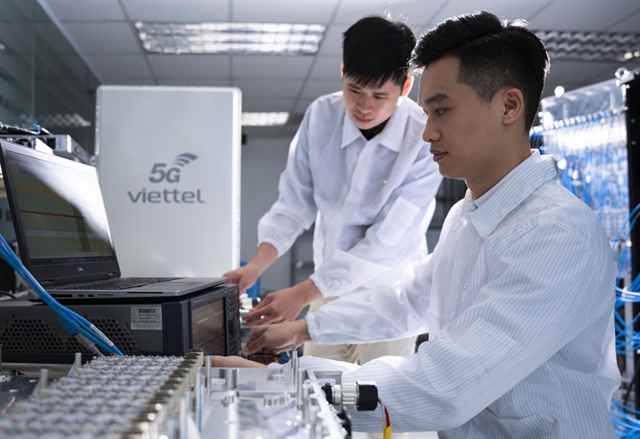 |
| Deputy Minister of Science and Technology Bùi Thế Duy. — Photo vnexpress.net |
The 2013 Law on Science and Technology will be amended and renamed the Law on Science, Technology and Innovation, helping to remove institutional obstacles and promote research results to the market, according to Deputy Minister of Science and Technology Bùi Thế Duy.
Duy said that the amended 2013 Law on Science and Technology will be submitted to the National Assembly for consideration and comments in May 2025.
According to the official, one of the 'bottlenecks' that makes it difficult for research results to be translated into practice is related to the legal framework. In particular, the law on science and technology and many related laws do not accept the fact that sometimes scientists do research without producing results. This leads to the fact that when registering tasks, scientists do not dare to register new content, mainly creating content at a safe level so it is not new and cannot be brought to life.
“Besides, scientific and technological results also take a long time, 10-20 years, to be brought to life, so if we only evaluate the results of commercialisation in one to five years, it is not complete,” said Duy.
The second reason is due to the separation between research-development and production-business sectors.
Duy said that the 2013 Law on Science and Technology mentioned the issue of ordering research, but the ordering must be from businesses or associated with universities and businesses must be through staff exchange activities. Currently, the staff exchange corridor is not favourable or a mandatory activity for lecturers and researchers.
"The proposed revised law suggests introducing a corridor for scientists to work with businesses, which are still considered research and teaching activities," Duy said.
Clearly defining the stages in research and development activities and innovation activities is also an issue of concern in amending the law. Currently, the fact that university research must be transferred to businesses is not practical. Therefore, the revised law needs to promote experimental production in businesses and analyse the market to produce final products.
"The amended law will create a corridor for intermediary organisations to protect intellectual property and form a new science and technology market to facilitate the transfer of results," said the deputy minister.
He also suggested that national programmes need to have a mechanism to assign results to the most favourable host organisation, considering science and technology investment as a long-term investment, automatically assigning authority for the lead agency to continue using it for commercialisation and further investment to create new products.
In the proposals to amend the Law on Science and Technology, Deputy Minister Duy also emphasised new groups of policy issues. Accordingly, to develop science and technology activities in universities, it is necessary to have research content, activities and investment funds for the university. For example, there needs to be a programme to train graduate students with funding from science and technology.
Duy said that many countries around the world consider graduate students as the main research force because they are young, creative and passionate about their work. Therefore, it is necessary to develop training programmes, considering them as researchers and research workers, not just students.
 |
| A Viettel engineer doing some research. — Photo vnexpress.net |
Prof. Dr. Nguyễn Hữu Đức, Hanoi National University, expects that the amended law will create a new legal corridor, creating conditions for development and encouraging innovation.
"This is the first time we have formalised the concept of innovation, which will help build a new culture for Vietnamese people," Đức said.
Hanoi National University currently focuses on investing in creative student startups. According to Professor Đức, it is necessary to prepare human resources for innovation, adding subjects on inventive and creative entrepreneurship into general subjects so that students have the skills and capacity to be pioneers.
Shortcomings in financial investment mechanisms for science and technology
Currently, the financial investment mechanism for science and technology still has many shortcomings. Deputy Minister Duy said that the Ministry of Science and Technology has researched and evaluated the entire legal system, including many related laws. The reality is that there is a lack of synchronisation between laws on science and technology and laws on finance.
“Once there are investment funds and resources, they need to be used effectively, openly and quickly. To achieve this, the science and technology industry needs to strongly amend regulations related to science and technology tasks, topics, projects, decentralisation and reform of administrative procedures," said Duy.
“The goal is to be open and transparent, thereby selecting the best topics and tasks quickly and conveniently.”
The first thing that needs to be resolved is how to synchronise the provisions of the Law on Science and Technology with existing financial policies, to make the most of all of these policies.
In addition, it is necessary to adjust regulations on procurement and bidding when using investment funds for technology, including public investment funds from the State and funds from enterprises. This will encourage State support mechanisms.
"It is necessary to research new issues, core technologies and even purchase research results and inventions from abroad, then transfer them to businesses so they can use and develop", said Duy.
To "find a common voice between managers, financial investors and scientists", the Deputy Minister believes that it is necessary to share the view that State funding for science and technology results should be considered a long-term investment.
Instead of requiring immediate payment, funds should be assigned to the host units and production units so they can invest and develop production and business. When these units create jobs and pay taxes, the State will recover capital through taxes and reinvest in scientific and technological activities.
To achieve this, there needs to be close cooperation between science and technology agencies and financial agencies to understand each other and coordinate effectively.
Therefore, the ministry proposes that the Law will regulate the determination of what is property and what is not property in scientific and technological results. For example, results that have been widely published and become human knowledge cannot be considered 'private property'.
"We believe that sharing this perspective will help adjust the legal corridor of the Law on Science and Technology as well as other laws, so that they become more appropriate and operate more effectively, thereby creating an open environment for science, technology and innovation activities," emphasised Duy.
VNS





